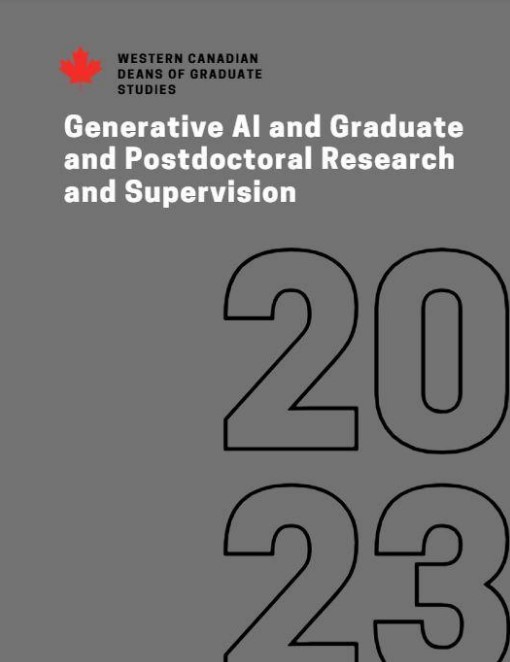Generative AI: Graduate and Research Supervision

Generative AI and Large Language Modules (LLM) are changing the way researchers and students navigate the academic landscape. Early adopters are finding many useful ways to employ these new tools like CHAT GPT, while others may appreciate or endure the editing suggestions of tools like Grammerly. To stay current as mentors, supervisors of graduate students require ongoing professional development.
To support supervisors of graduate students and foster a community of faculty members and staff committed to high-quality supervision and mentorship, GPS has created and curated relevant resources to be explored.
Familiarize Yourself With The University Of Alberta + National Guidelines
In response to the rapid adoption of generative AI tools, the University of Alberta and other Canadian universities came together to develop principles to help administrators (including coordinators, associate chairs, and deans) and faculty members provide supervisory guidance to their graduate students and postdoctoral fellows.
GPS Guidelines: Responsible and Ethical Use of Generative AI in Graduate Thesis, Research, and Writing
Western Canadian Deans of Graduate Studies - Generative AI and Graduate + Postdoctoral Research and Supervision
The report discusses the possibilities and challenges of the use of generative AI in graduate thesis, postdoctoral research and writing including applications for admission and scholarships. It provides a set of recommended practices on responsible and ethical uses of generative AI for associate deans and deans of graduate studies as well as for advising and supervising graduate students and postdoctoral fellows. The report encourages faculties of graduate studies to develop AI literacy educational opportunities for graduate supervisors and students, and postdoctoral researchers. The key recommendation categories are as follows:
- University-wide responsibilities and considerations
- Academic writing: Theses, dissertations, candidacy and research papers, course assignments
- Research (Idea generation, literature reviews, data analysis)
- Citations and references
- Graduate and postdoc application proposals
- Scholarships and awards application proposals
Workshop + Conversation with Graduate Supervisors on Generative AI held Thursday, 22 June 2023.
With the release of ChatGPT at the end of November 2022, there has been much discussion about the impacts on higher education. To date, much of that conversation has understandably focussed on undergraduate education. The Faculty of Graduate & Postdoctoral Studies together with the Office of the Provost invited graduate supervisors to have a facilitated conversation about the impacts of generative AI on graduate education. This document captures the conversation that addressed the following questions:
- What role can generative AI play in the different stages of the research process?
- How has dissertation and thesis research been impacted or changed since the arrival of generative AI?
- What types of support do graduate supervisors need to navigate graduate education post generative AI?
- How can we best educate graduate students to ethically conduct research and writing in the context of generative AI?
- What does AI literacy look like in graduate education?
Four key topics were captured:
- AI Literacy Development - For Faculty and Graduate Students;
- AI Educational Development - For Faculty and Graduate Students;
- Ethics, Equity, and Bias; and
- Re-Imagining Graduate-Level Assessments.
Campus Resources
- Teaching in the Context of AI
This toolkit by the Centre for Teaching and Learning gives instructors guidance on addressing AI in your teaching. - U of A Libraries - Using Generative AI
This site provides links to general applications of AI, how to use tools, ethics and evaluation. - Recording from the Oct 2023 Chat GPT 101
Want a general idea of how Large Language Modules works?
Check out this short interactive article.
The generative AI market is ever evolving and it can be difficult to keep up. Here's one article that can give you a sense of the top competitors.
